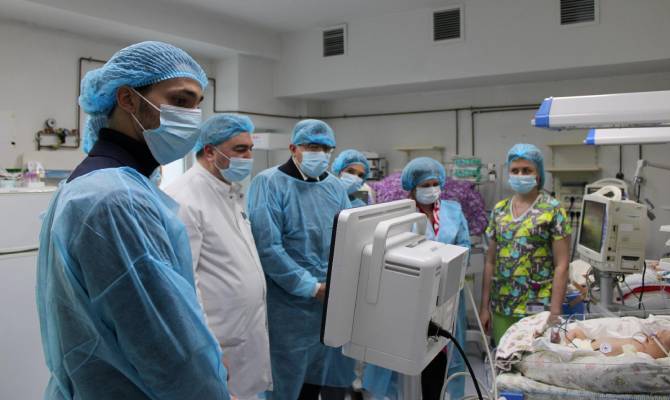Gabriela is 43 years old and works as a medical assistant in the neonatology department at Edinet hospital, in northern Moldova. The facility serves one of the most urbanized areas of the country. With an average of 1,300 deliveries per year, of which 200 involve complications, the hospital is one of the most efficient in the region. Yet, a team of only 17 people including doctors, specialists, and nurses work there under consistent straint.
In 2024, there was a significant number of premature births. Despite the difficulties, the staff is now undoubtedly responsive and prepared to act in different scenarios, as Gabriela says:
“We are prepared for cases where, for example, the baby inhales amniotic fluid: the team acts to suction the fluid, insert a venous catheter for antibiotic treatment, and in severe cases, perform a gastric lavage. We are used to handling these situations, and the team works harmoniously and efficiently. However, if the baby is born prematurely, the situation becomes more complicated”.
The management of critical newborns is a challenge for the health team at Edinet since the hospital is not equipped with a intensive care unit. To transfer patients to Chisinau, where the only intensive care unit is, an ambulance from Balti must be mobilise. The vehicle drives 80km north to reach Edinet, then it covers 200km to get to IMAC Hospital where the baby can finally receive adequate care.
This is how the system works in many areas where rural hospitals have little means to properly assist their patients and the distance from Chisinau hinder the provision of timely care.
“Recently, I dealt with a premature birth of a newborn weighing 0.7 kg. It was morning, and I was on duty with a neonatologist, an obstetrician-gynecologist, and a midwife. I worked with the team to manage the initial emergency until the mobile intensive care unit arrived. Fortunately, the baby responded well to stabilization! But for us, it’s always a stressful moment because we know that logistical difficulties can have a huge impact on care. However, I remember it was a beautiful day, it hadn’t rained, and the roads were in good condition, so we knew there wouldn’t be any delays”.
The lack of specialized doctors and health workforce puts an additional strain on the healthcare system in Moldova. At the neonatal ward in Edinet Hospital there is only one neonatologist.
That morning, as Gabriela recalls, the doctor arrived just in time yet, had he not been available, Gabriela and her colleagues would have been able to perform all the steps of the emergency algorithm. The training offered through the project has indeed given the staff the competencies to respond more effectively to challenges, reduce stress levels, and organize better teamwork.
As part of the Emergency Call to Support Ukraine, funded by AICS with €46.5 million, CUAMM is supporting 7 second-level hospitals in the neonatal emergency stabilization and resuscitation.
Gabriela fondly remembers the two-day training, during which local trainers and the Italian doctor shared the new findings from the Neonatal Stabilization Guidelines and organized both theoretical lessons and practical sessions to simulate various emergency situations in the delivery room. In addition, by participating in the training course Gabriela and her team gained essential competencies like taking blood samples from the baby to determine oxygen saturation levels. This is particularly important in difficult deliveries, where the mother’s contraction forces are weak, and the baby experiences a traumatic birth.
“By measuring oxygen saturation, we can detect potential hypoxia or other trauma, but in my opinion, it also gives us an idea of how much the baby suffered during delivery. This is incredibly important to me because, in addition to guiding us on how to manage the situation, it reminds us that newborns, from the very first seconds, have an intense emotional experience of the world”.
Over the last year, Doctors with Africa UK has supported medical and health staff across Moldova with 8 training sessions on neonatal emergencies and stabilization aimed at facilities of different levels. Starting with a Training of trainers in Chisinau, the activity was later expanded to seven additional facilities. As a result, an overall number of 100 health workers have been trained.
This activity is a part of the RISE project: Integrated Response to Support the Emergency in Ukraine. Our project is part of a 46.5 million euro initiative funded by the Italian Agency for Development Cooperation, reaching 900,000+ people affected by the Ukraine crisis.





